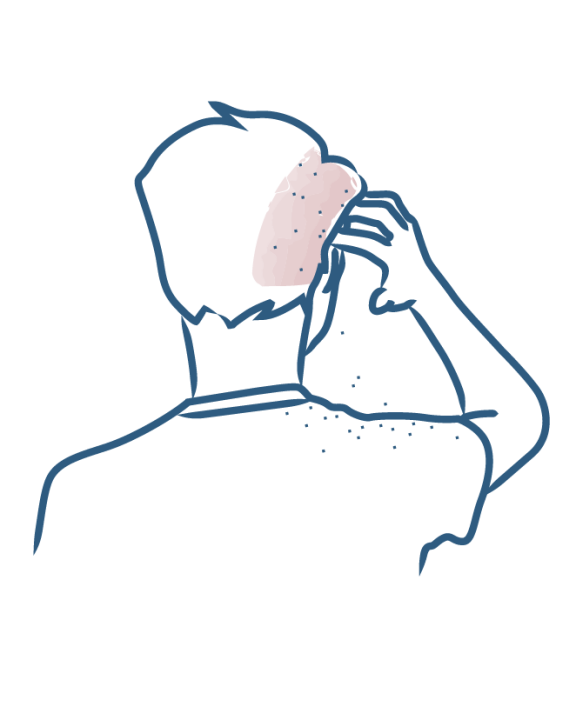Which dandruff treatment should I choose?
Anti-dandruff shampoo
There are lots of treatments in the form of shampoos for eliminating dandruff. Your choice will depend on the severity of the condition and the type of scalp.
Treating simple to moderate dandruff conditions
For simple to moderate dandruff conditions, i.e. mild desquamation with a little inflammation, treatment consists of using a suitable anti-dandruff shampoo, which must above all be used according to the instructions, i.e. applied correctly and regularly, and left on for the right amount of time.
Many shampoos are available without a prescription, so ask your pharmacist for advice and to help you find the right one for you.
Different anti-dandruff shampoos have different actions (to fight oily or dry dandruff) and different ingredients (zinc pyrithione, piroctone olamine, selenium sulfide or salicylic acid).
These active ingredients enable the shampoos to act:
- Against the yeasts of the genus Malassezia, involved in the development of dandruff
- By limiting the proliferation of cells on the scalp thanks to a keratolytic action.
- And against redness and itching thanks to an anti-inflammatory action.
Therefore, the same shampoo cannot be used for different types of dandruff (oily or dry).
Shampoo for oily dandruff is suitable for an oily scalp and will also act on excess sebum.
Whereas shampoo for dry dandruff will help fight dandruff while providing the hydration needed for a dry and irritated scalp.
Most of the time treatment begins with an "intensive" phase to tackle the dandruff flare-up, during which you will wash your hair 2 to 3 times a week for 2 to 4 weeks. This is followed by a maintenance phase which consists of using the same anti-dandruff shampoo but once a week or once every two weeks, alternating with a mild shampoo (shampoos with a gentle cleansing base of the same pH as the skin).
These treatments can sometimes have a drying effect, called the "straw effect". If this happens, you will need to change your treatment shampoo or use it less frequently and replace it with a mild shampoo.
In addition to treatment shampoos, there are also other products that have complementary actions for fighting dandruff. These include not only lotions, but also masks. They can boost the effectiveness of treatments and improve the condition of the scalp.
Treating severe dandruff and seborrheic dermatitis
In case of severe dandruff (i.e. very large quantities of dandruff and a very inflamed scalp) and in people suffering from seborrheic dermatitis in the hair (oily dandruff in large quantities with a lot of itching and irritation), "therapeutic" shampoos are used, which act against the yeasts of the genus Malassezia. They generally contain ketoconazole or ciclopirox olamine. These dandruff treatments may require a medical prescription and be partially reimbursed by social security. They are used for 4 weeks, and must then be continued as part of a maintenance treatment.
In case of severe dandruff conditions, it is important to consult a dermatologist to establish the most effective treatment. And if the treatment does not work, do not hang around but consult again – it can sometimes take a while to find the right treatment.
More information
- Discover How can I get rid of dandruff?
Which dandruff treatment should I choose?
How can I get rid of dandruff?
Our care routines
Dandruff conditions

